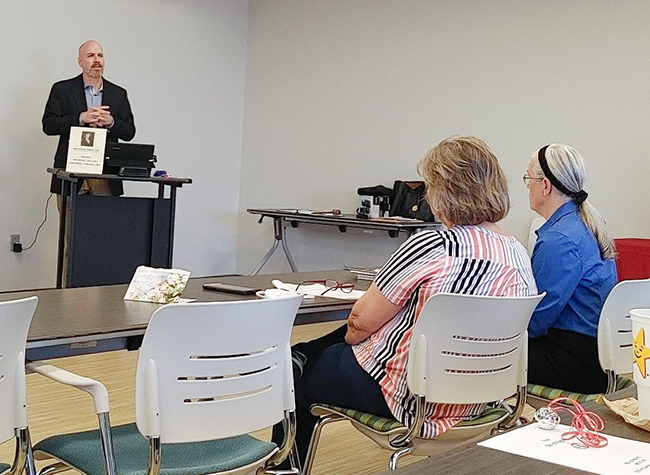Judge Dennis “Will” Roach II Speaks On 8th Amendment To U.S. Constitution

MDW Chapter Recording Secretary Karen Bible and First Vice Regent Janet Guyett listen intently to Jefferson County General Sessions Court Judge Dennis “Will” Roach II as he explains the bail process and its relation to the Eighth Amendment to the U.S. Constitutiion.
Photo Submitted by Jane Busdeker
The issue of bail reform has been in the forefront of the news in many states over the past two years. The Eighth Amendment to the U.S. Constitution states, “Excessive bail shall not be required, nor excessive fines imposed, nor cruel and unusual punishments inflicted.” That amendment deals with the issue of bail in just six words; however, many more words have been spoken and printed by those who have tried to determine how the amendment should be applied.
Jefferson County General Sessions Court Judge Dennis “Will” Roach II spoke about the Eighth Amendment at the September 11 meeting of the Martha Dandridge Washington (MDW) Chapter, National Society, Daughters f the American Revolution (NSDAR). Many liberal states have changed their bail statutes to reduce the number of violations that bail can be set for and reduce the amount of bail for many other charges. The result is that accused lawbreakers are back out on the streets very quickly.
Judge Roach explained that bail is assigned by a magistrate for two main reasons: 1. To secure the court appearance of the person arrested; 2. To keep the community safe from the arrested person who is suspected of committing such serious crimes as child rape, sale of drugs, and first-degree murder.
Because a person is considered legally innocent until proven guilty, the bond must be reasonable. Authorities do not want an innocent person in jail, he said.
Judge Roach stated, “I see bail as a very, very important part of what I do.”
Steps in the bonding process begin with the magistrate’s determining certain information:
- Do the accused persons live in the community? Do they have family there? Do they have jobs? Do they have a criminal history? Is there a likelihood that the persons will commit further crimes? How serious were the initial crimes? The amount of bond is often preliminarily set based upon the seriousness of the crime.
- At the bond hearing, the bond is individualized, and the magistrate has the opportunity to hear from the accused who can argue to have the bond reduced. The public defender can also argue for lowering the bond.
- Finally, the judge decides the amount of the bond. Once bond is set, the accused usually pays 10% in cash. If the accused does not appear for court, that person or the accused’s bond company forfeits the bond.
The judges who set bond have a very limited time to hear the issues and make decisions.
In Jefferson County there is an average of 111 defendants each day of criminal court. In the midst of the process, the judge must consider what could happen if the accused is allowed bond and released into the community to commit another crime.
According to Judge Roach, imperfect individuals must apply precepts under great time constraints in the bail-setting process.
Although the bail process is not perfect, it is provided by our courts in an attempt to protect the rights of the accused and of the public.

MDW Chapter Treasurer Wendy Randolph presents Judge Dennis “Will” Roach with a $25.00 check to be used for a charity of his choosing in gratitude for his talk on the purpose and process of the Eighth Amendment to the U.S. Constitution.
Photo Submitted by Jane Busdeker
For information about the DAR, contact Registrar Karen McFarland at (865) 258-8670 or Regent Jane Chambers at (865) 591-3857.












